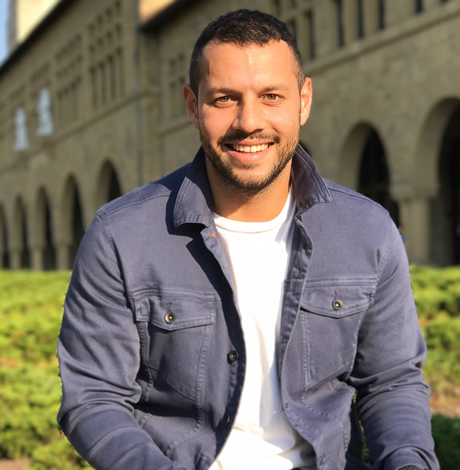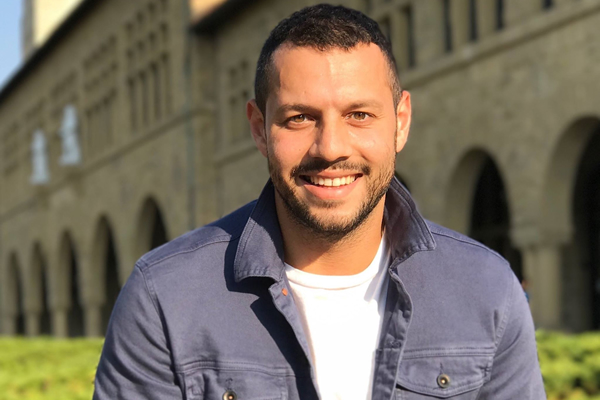Arts & Entertainment
Anti-conversion therapy activist was consultant on ‘Boy Erased’
Born Perfect Campaign co-founder Mathew Shurka shares survivor experience


Mathew Shurka says conversion therapy is flourishing in places people would not expect. (Photo courtesy Shurka)
Mathew Shurka knows first-hand the horrors of “conversion” therapy. Despite what he says were good intentions on the part of his parents, five years of the practice he calls “particularly cruel and damaging” with a licensed therapist who claimed he could make gay people straight took a heavy toll.
Shurka now works as an anti-conversion therapy activist with the Born Perfect Campaign. He’s co-founder and strategist for the project that’s part of the National Center for Lesbian Rights. Based in New York, he’s one of four full-time staff members working on the project.
Shurka knew “Boy Erased” author Garrard Conley years before he wrote his memoir which has been adapted into the movie of the same name (see review here). Shurka and the Born Perfect team were involved throughout the making of the film as consultants to ensure accuracy and sensitivity.
“They really kept us in the conversation the whole time,” Shurka says. “Myself and two other representatives were on the set in, we gave feedback on the script through each round of edits, and then actually involved in the editing rooms. Every time they did a big round of edits, they wanted to make sure it would still make sense to a viewer who’s never even heard of conversion therapy. And then also down to the marketing and stories of survivors. They really kept us in the conversation the whole time.”
Shurka says seeing a major screen production devoted to the topic and being involved in its creation has been powerful.
“I contemplated suicide for two years,” the 30-year-old New York native says. “Conversion therapy was a trauma that I survived and it altered my life forever so to be part of this movie has been really surreal.”
Shurka’s work with the campaign involves keeping tabs on where conversion therapy-related legislation is in the works throughout the country. It’s still legal for minors in most of the U.S. Shurka visits states considering bans and works with regional LGBT groups to ensure passage. He’s not a lobbyist but says his personal story as a survivor gives him credibility with legislators. The campaign was launched in 2014.
Shurka says conversion therapy is alive and well in the U.S. and flourishing in places people might not expect.
“There’s actually a concentration of it in Los Angeles and New York which people can’t even imagine,” he says. “Think, ‘Oh yeah, it’s in Arkansas, that makes sense,’ but actually the biggest organizations are in big cities. … In Los Angeles, they’re in Orange County or in L.A. proper, they’re in urban areas and we’ve seen new ones open in Manhattan in the last two to three years. They’re disguised as therapists and they use different terminology. They sell it as a form of addiction and are very sneaky about it.”
Shurka says that although 2018 has been his organization’s most successful year, 2019 is “looking scarier than ever.”
He says “Boy Erased” provides unprecedented exposure for the issue.
“I think this has great potential to shift or transform hears and minds,” he says.
Find out more about the Born Perfect Campaign at nclrights.org/born-perfect.
a&e features
Eastern Shore chef named James Beard Finalist
Harley Peet creates inventive food in an inclusive space

In a small Eastern Shore town filled with boutiques, galleries, and the occasional cry of waterfowl from the Chesapeake, Chef Harley Peet is most at home. In his Viennese-inflected, Maryland-sourced fine-dining destination Bas Rouge, Peet draws from his Northern Michigan upbringing, Culinary Institute of America education, and identity as a gay man, for inspiration.
And recently, Peet was named a James Beard Finalist for Best Chef: Mid-Atlantic – the first “Best Chef: Mid-Atlantic” finalist representing the Eastern Shore.
Peet, after graduation from the Culinary Institute of America, took a position as sous chef at Tilghman Island Inn, not far from Bas Rouge. Falling in love with the Eastern Shore, he continued his passion for racing sailboats, boating, gardening, and fishing, and living his somewhat pastoral life as he opened Bas Rouge in 2016 as head chef, a restaurant part of the Bluepoint Hospitality group, which runs more than a dozen concepts in and around Easton, Md.
Coming from a rural area and being gay, Peet knew he had his work cut out for him. He was always aware that the service and hospitality industry “can be down and dirty and rough.”
Now as a leader in the kitchen, he aims to “set a good example, and treat people how I want to be treated. I also want to make sure if you’re at our establishment, I’m the first to stand up and say something.”
The Bas Rouge cuisine, he says, is Contemporary European. “I’m inspired by old-world techniques of countries like Austria, Germany, and France, but I love putting a new spin on classic dishes and finding innovative ways to incorporate the bounty of local Chesapeake ingredients.”
His proudest dish: the humble-yet-elevated Wiener Schnitzel. “It is authentic to what one would expect to find in Vienna, down to the Lingonberries.” From his in-house bakery, Peet dries and grinds the housemade Kaiser-Semmel bread to use as the breadcrumbs.
Peet works to support the LGBTQ community inside and outside of the kitchen. “I love that our Bluepoint Hospitality team has created welcoming spaces where our patrons feel comfortable dining at each of our establishments. Our staff have a genuine respect for one another and work together free of judgment.”
Representing Bluepoint, Peet has participated in events like Chefs for Equality with the Human Rights Campaign, advocating for LGBTQ rights.
At Bas Rouge, Peet brings together his passion for inclusion steeped in a sustainability ethic. He sees environmental stewardship as a way of life. Peet and his husband have lived and worked on their own organic farm for several years. Through research in Europe, he learned about international marine sourcing. Witnessing the impacts of overfishing, Peet considers his own role in promoting eco-friendly practices at Bas Rouge. To that end, he ensures responsible sourcing commitments through his purveyors, relationships that have helped create significant change in how people dine in Easton.
“I have built great relationships in the community and there’s nothing better than one of our long-standing purveyors stopping in with a cooler of fresh fish from the Chesapeake Bay. This goes especially for catching and plating the invasive blue catfish species, which helps control the species’ threat to the local ecosystem.
Through his kitchen exploits, Peet expressed a unique connection to another gay icon in a rural fine-dining restaurant: Patrick O’Connell, of three Michelin starred Inn at Little Washington. In fact, Peet’s husband helped design some of O’Connell’s kitchen spaces. They’ve both been able to navigate treacherous restaurant-industry waters, and have come out triumphant and celebrated. Of O’Connell, Peet says that he “sees [his restaurants] as canvas, all artistry, he sees this as every night is a show.” But at the same time, his “judgment-free space makes him a role model.”
Being in Easton itself is not without challenges. Sourcing is a challenge, having to either fly or ship in ingredients, whereas urban restaurants have the benefit of trucking, he says. The small town “is romantic and charming,” but logistics are difficult – one of the reasons that Peet ensures his team is diverse, building in different viewpoints, and also “making things a hell of a lot more fun.”
Reflecting on challenges and finding (and creating) space on the Eastern Shore, Peet confirmed how important it was to surround himself with people who set a good example, and “if you don’t like the way something is going, fuck them and move on.”

Team DC, the umbrella organization for LGBTQ-friendly sports teams and leagues in the D.C. area, held its annual Night of Champions Awards Gala on Saturday, April 20 at the Hilton National Mall. The organization gave out scholarships to area LGBTQ student athletes as well as awards to the Different Drummers, Kelly Laczko of Duplex Diner, Stacy Smith of the Edmund Burke School, Bryan Frank of Triout, JC Adams of DCG Basketball and the DC Gay Flag Football League.
(Washington Blade photos by Michael Key)




















The 2024 National Cannabis Festival was held at the Fields at RFK Stadium on April 19-20.
(Washington Blade photos by Michael Key)
















Covering the @NatlCannaFest at RFK Stadium for @WashBlade . Stop by the LGBTQ+ booth and pick up a paper if you are here. pic.twitter.com/is7hnsaPns
— Michael Patrick Key (@MichaelKeyWB) April 20, 2024
-

 State Department2 days ago
State Department2 days agoState Department releases annual human rights report
-

 Maryland4 days ago
Maryland4 days agoJoe Vogel campaign holds ‘Big Gay Canvass Kickoff’
-

 Politics3 days ago
Politics3 days agoSmithsonian staff concerned about future of LGBTQ programming amid GOP scrutiny
-

 The White House1 day ago
The White House1 day agoWhite House debuts action plan targeting pollutants in drinking water












